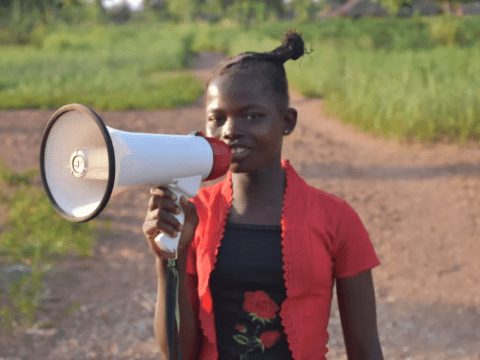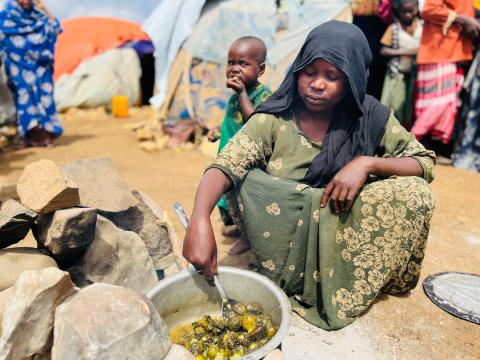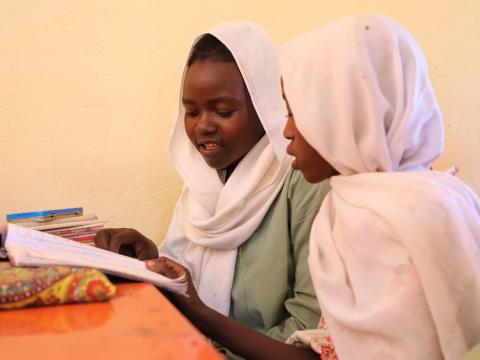
A worsening hunger crisis and healthcare system
Dr. Yosh Kasilima issues a stark and urgent warning that Sudan is becoming catastrophic for children, threatening "mass casualties".
The impact of the conflict on children in Sudan is profound, far-reaching, and an undeniable fact. From the very onset of the conflict, about 14 million children required humanitarian aid, while nearly 5 million children were forced to flee their homes seeking a safe space. Not to mention, the one million children displaced across borders. But, most alarmingly, 730,000 children currently suffer from severe acute malnutrition, which is defined as an imbalance between the nutrients your body needs to function, and the nutrients it gets. Combine that with a healthcare system on the verge of collapse, and you have a full-scale humanitarian crisis.
Healthcare systems in Sudan have, for a very long time, been weak with access and capacity to deliver equitable health and nutrition services, with one of the slowest reductions in child and maternal mortality rates in the world. Even before the conflict broke out, Sudan was far from achieving its global target development goals but with the onset of the current conflict, it is seeing hunger and malnutrition levels skyrocket to dangerous levels, outpacing the resources available to help.
But, as World Vision’s Director of Strategy and Program Quality, working with Sudan’s most vulnerable on a day-to-day basis, I see first-hand that access to nutrition, food services and health interventions has increasingly become infeasible due to the looming insecurity. I am reminded of Alnour and his family of eight children, his wife, Aisha, and his brother’s widow Halima. The recent crisis in Sudan has forced the entire family to leave their village in South Kordofan and find themselves in settlements for Internally Displaced Persons (IDPs), leaving them with no means to make a living. Life in the IDP settlement is not easy for Alnour and his family, despite the food assistance received from the joint programme by World Vision and the World Food Programme, the family is still food insecure and has to reduce their meals to two per day; sometimes having to cut down the portion sizes. Discouragingly, the story of Alnour represents the situation for the majority of Sudanese families impacted by the conflict. It has disrupted their livelihoods and created massive barriers for them to access food and other basic services.
The organisation responsible for food security classifications globally called the Integrated Food Security Phase Classification, or IPC, recently revealed that over half of Sudan’s population (almost 26M people) face high levels of acute food insecurity, and among them, 755,000 are in a state of catastrophe creating a situation in which famine is looming in 14 separate areas.
World Vision, being a child-focused humanitarian organisation, is right now focusing on how food insecurities and the threat of famine are impacting child well-being in Sudan. What we’re seeing over and over is children who are experiencing acute malnutrition develop suppressed body immunity which leads to extreme vulnerability to diseases. If left untreated, will result in mass causalities. The need to take immediate action to address the issue of nutritious food accessibility to the 730,000 children in Sudan who suffer from severe acute malnutrition could not be more critical.
So, what’s the solution? What exactly needs to be done to avert mass hunger-related child deaths? The answer is clearer than one might think. Addressing hunger related deaths in Sudan requires a complicated, multisectoral response, however, the quickest and most effective solution lies in stopping the conflict. From experience, we see that issues of hunger and healthcare are much more easily addressed once there is relative peace in the country. If international actors fail to provide a cease fire related agreement, the dire situation will continue to worsen, and people like Alnour and his family, will continue to struggle to survive.
ENDS
About World Vision the Sudan Crisis and Migration Response –
- World Vision is an independent, impartial and politically neutral humanitarian organization. Our response team is in Sudan and the neighbouring countries, providing much-needed life-saving humanitarian assistance to millions of people displaced by conflict.
- World Vision is in Sudan providing much-needed life-saving relief assistance. Through our Sudan Crisis and Migration Response, World Vision has reached nearly over 1.9 million people including children, in Sudan alone, with life-saving relief assistance including food assistance, WASH (Water, Health and Sanitation) and protection services, and multi-purpose cash assistance that provides affected people with the choice, control and flexibility to buy what they need.
- World Vision is committed to addressing the increasing food insecurity crisis in Sudan so that children and their families affected by the ongoing conflict have access to nutritious food for their well-being and development. The international community and parties to the conflict must take immediate action to prevent a catastrophic malnutrition emergency.
- World Vision is also calling for aid agencies’ humanitarian imperative to be fully respected and given unhindered access to those in need.
Dr. Yosh Kasilima is a Director of Strategy, Program Quality and Evidence at World Vision Sudan, a role he has held since August 2020. He has over 12 years’ senior management experience in World Vision International and over 26 years combined experience in Humanitarian and Development Industry providing leadership for complex programs in both development and Fragile Context while embracing the triple nexus of Humanitarian, Development and Peace Building with significant change results. Prior to joining World Vision Sudan, he worked with World Vision International in Tanzania as the Programs Director for eight years and before that he has worked with ActionAid Denmark in a Regional capacity as East & South African Region M&E Expert, then worked with the Ministry of Finance and Economic Affairs in Tanzania, and Evangelical Lutheran Church in different Technical, leadership and managerial roles.


